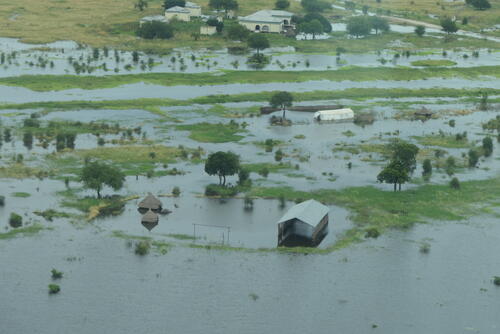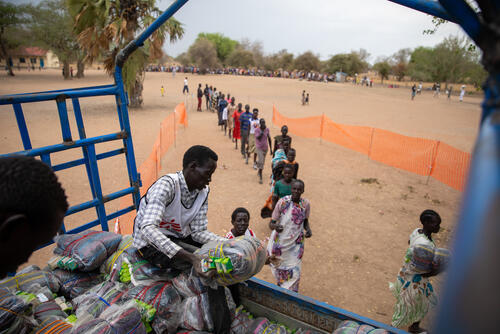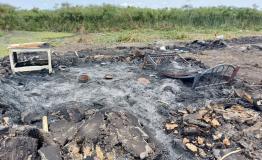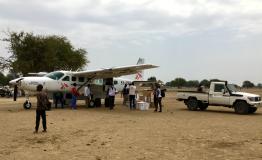- Severe floods in Bentiu, South Sudan, have left thousands of people displaced and living in dire conditions.
- The lack of food and water and sanitation measures is placing people at risk of outbreaks of disease.
- MSF urges humanitarian organisations, the UN and the South Sudanese government to immediately scale up food and water and sanitation services.
Juba/Amsterdam – People in Bentiu, northern South Sudan, are facing outbreaks of infectious and waterborne diseases, increased food insecurity and malnutrition, due to some of the most severe floods in decades. A failure of humanitarian organisations and authorities to scale up the response quickly enough has left at least 152,000 displaced people in horrific living conditions. Médecins Sans Frontières (MSF) calls on other humanitarian organisations in Bentiu, as well as the United Nations, the Ministry of Health and the government of South Sudan, to urgently increase food and nutrition assistance, water and sanitation services, shelter and healthcare.
“The dangerously slow and inadequate humanitarian response is putting lives at risk,” says Will Turner, MSF emergency operations manager. “The deplorable situation inside Bentiu displacement camp is not a new phenomenon.”
“For years, we have repeatedly warned about the dire conditions, yet other organisations and agencies responsible for the water and sanitation services in the camp have not sufficiently increased or adjusted their activities,” says Turner. “Now we are facing a situation where even in this current crisis, there seems to be paralysis in action, resulting in horrific living conditions and huge health risks for the people living in Bentiu camp and across makeshift camps in Bentiu town.”
People cannot continue to live in such undignified conditions, unnecessarily exposed to preventable diseases... Urgent action from other organisations and agencies is needed now.Will Turner, MSF emergency operations manager
This year’s floods have hit people in Bentiu, the hardest, while over 800,000 people across the country have been affected. The number of people in Bentiu internally displaced persons camp (formerly a Protection of Civilians site) has grown by 12,000 in just a couple of months, and now holds at least 120,000 people.
With the influx of people in Bentiu camp, the MSF hospital is now completely over capacity. The majority of patients are children under the age of five with malaria, respiratory tract infections and malnutrition.
“We are extremely concerned about malnutrition,” says Jacob Goldberg, MSF emergency medical manager. “Severe acute malnutrition levels are two times the WHO threshold, and the number of children admitted to our hospital with severe malnutrition has doubled since the start of the floods.”
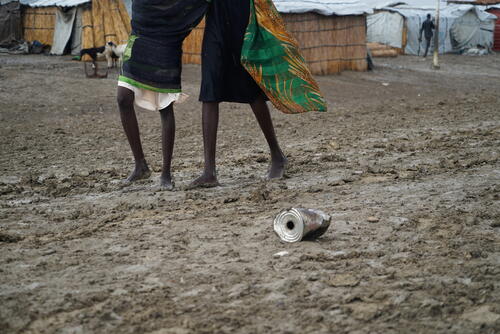
In Bentiu camp, the living conditions are abhorrent. The sewage treatment site has been cut off for weeks by flood water, meaning there are almost no usable latrines in the camp. With the already deplorable conditions even further worsened by the influx of new arrivals, people are at higher risk of outbreaks and waterborne diseases such as acute watery diarrhoea, cholera and malaria. Our teams have quickly scaled up activities, and brought in an additional emergency team.
“The humanitarian response in Bentiu needs to urgently shift gears,” says Turner. “There is still not enough food assistance within or outside Bentiu camp despite the influx of displaced people, with food rations cut by half earlier this year.”
“People simply cannot continue to be forced to live in such undignified conditions, unnecessarily exposed to preventable diseases,” says Turner. “Urgent action from other organisations and agencies is needed now.”
MSF first started working in Bentiu, capital of Unity State, in 2000, providing medical care to displaced people who had fled violence and fighting. In Bentiu town, the MSF clinic focuses on sexual and gender-based violence (SGBV) services and sexual and reproductive health, with outreach activities including health promotion and community engagement.
In Bentiu camp, the largest camp for displaced people in South Sudan, MSF has provided healthcare services since the formation of the camp in 2014. We provide specialist healthcare, surgery and emergency services for adults and children in our hospital, as well as an outreach team within the camp, and emergency response capacity to respond to disease outbreaks.



